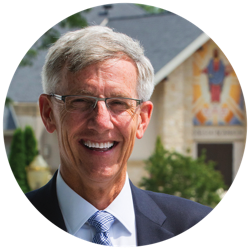This is the season for high school seniors to make final visitations and applications for higher education. A campus visit typically exposes the senior to faculty, staff, and students all seeking to highlight the uniqueness of their school. They might market their number of National Merit Scholars, scores on student standardized examinations, and exceptional student athletes as well as faculty-to-student ratios. If visiting a Catholic college or university (CCU), the would-be student would undoubtedly be offered a visit to the chapel, shown campus ministry activities, and maybe even told of a Sunday evening Mass offered in the dormitories.
One question you should ask is, “how many of the theologians hold a mandatum?”
If they don’t know or won’t tell you, then that might be an important factor if you are seeking a Catholic higher education experience that is committed to offering students a balanced view on critical questions.
Let me explain.
Does it matter if the theologians on the faculty have made a (usually written) declaration that they will teach in full communion with the Church? The mandatum, offered by an ecclesiastical authority such as the local Bishop, is an acknowledgement by the Church that the theologian will not misrepresent Church teachings. As practitioners, the theologians retain the academic freedom to research and explore and consider by evidence and argument the reasons for the truths taught by the Catholic Church. That is what theology is and what theologians do. In that context, however, the theologian remains accountable to those Jesus Christ divinely empowered to authoritatively teach the faith—the Bishops of the Catholic Church in communion with the Holy Father. Thus, as a safeguard to false (as opposed to faithful) dissent Blessed Pope John Paul II instituted the requirement for a mandatum in the wake of Second Vatican Council.
The Catholic understanding of human history, recorded as far back as the 4th century with Augustine, a Doctor of the Church, and reflected in all forms of Catholic education, offers two societal views: civitas dei (City of God) and civitas mundi (City of Earth). The City of God speaks to obedience to the will of God. The City of Earth, upon which the Catholic university is situated, is an existence whereby canon, liturgical, moral, and natural laws are the constructs that serve to maintain “fidelity to the Divine Founder . . . in accord with the salvific mission entrusted to the Church.” Canon law, in particular, is a fully functioning legal system that guides Church life, including educational undertakings. The system is comprised of dicta to be followed and enforced, courts to adjudicate disputes, and judgments that have impact on Catholic actions. Canon law provides a source of the obligations for the faithful based upon Church teachings—not civil law. The purpose of the canon law system, which addresses individuals and institutions, is summarized in the final Canon that reminds the faithful about “keeping in mind the salvation of souls, which in the Church must always be the supreme law.”
The current Code of Canon Law is organized into seven books, with Book III focusing on the role of education in the Church. Fully recognized in international and civil law, the right to freedom in education is well established. The Catholic Church, in particular, views education as necessary “for its divine mission of helping all to arrive at the fullness of Christian life” (Canon 794). Concomitant with the belief that parents are the primary educators of their children (Canon 793), Canons 807-814 speak directly to Catholic higher education. Seeing the role of the Catholic Church as one of support for parental duties in the area of education, it has “the right to establish and to direct schools for any field of study or of any kind and grade” (Canon 800). Further, a university may not bear the name “Catholic” in its title without approval from either the Holy See or the local bishop (Canon 808). Canon 809 stresses the requirement to teach “in the light of Catholic doctrine.” Finally, canon 812 instructs that those who teach theology must have a mandatum, or mandate, from a “competent ecclesiastical authority.” In totality, canon law serves as the essential constituent matter for the internal governance of the world’s largest Christian church.
The mandatum is a specific requirement in canon law that, in practice, may not currently enhance the laity’s understanding of CCU’s institutional alignment with the Catholic Church.
But perhaps it should.
One of the prescriptions from the 1983 Code of Canon Law is the requirement for a theologian to “have a mandate from the competent ecclesiastical authority” (Canon 812). This is reinforced in the Apostolic constitution Ex Corde Ecclesia (ECE) on Catholic Universities, reminding Catholic theologians “that they fulfill a mandate received for the Church” as well as the Application of ECE for the United States stating that “Catholics who teach the theological disciplines in a Catholic university are required to have a mandatum granted by competent ecclesiastical authority.” Unlike SAT scores, extracurricular clubs, and the number of majors offered at a particular CCU, the fact that their theologians do or do not hold the mandatum is rarely offered to prospective students. Rather, the prepared student or parent usually must ask.
It is important to note that it is an individual, not an institutional, requirement to receive the mandatum. Both the respective university and the theologian applicant are privately informed when the application process has concluded. The American bishops’ language seems to discourage public notifications, in general, and prohibits it without the theologian’s approval in those cases where the mandatum is denied. In turn, if individual theologians are silent then it follows that institutional silence should be considered neither unreasonable nor abnormal. The possible reasons for this reticence are many: to avoid negative media coverage in a society undergoing cultural changes with respect to religion, respect for the individual desires of the theologian, the desire to avoid controversy that might exist over fulfilling this requirement with colleagues within the academy, humility in the achievement, the inability to obtain the credential, or perhaps comfort with institutional stature such that the need or desire to market this credential is thought to be unnecessary.
Public image is important to any CCU. Given the core nature of the academic mission to a CCU, being justifiably proud of faculty that have established bona fides assuring others that they are teaching in communion with the Magisterium can be as distinctive to the Catholic academy as those other indicators are to secular institutions. However, while providing a prospective student the means to easily confirm the status of the mandatum process would be helpful in ascertaining alignment with the teachings of the Catholic Church, it would not be justified in concluding a misalignment if the information is not publicly available. As is written, there is no expectation that this information would be made readily available to the general public; that choice ultimately resides with the theologian. Thus, a prospective student would need to proactively seek the information on which theologians hold their mandatum. Finally, an inability to ascertain the status of meeting this canonical requirement is also information that is equally relevant in making a determination as to the strength of alignment of the CCU’s theology faculty with the Roman Catholic Church.
With the issuance of ECE in 1990, the Vatican established a framework for authentic Catholic higher education. However, some CCUs continue to debate and discuss ECE’s implications often suggesting presumed threats to institutional governance and academic freedom, and some disagreement continues over the imposition of the mandatum for theologians in CCUs. These issues were an active part of the dialog during the 20 years of debate prior to and now 25 years since Pope John Paul’s promulgation of ECE. The evidence provided by 45 years of discussion simply shows these concerns are unfounded. The impingement on academic freedom has shown to be unsubstantiated, and as the Federal government reminds Catholic educators almost every day the largest threat to an institution’s internal governance is a lack of Catholic identity that only serves to invite further government interference. The criticism with respect to the requirement to hold the mandatum credential only reinforces a governmental view that Catholic colleges and universities have become secular and no longer deserve to hold a place of privilege and distinction. The mandatum is a differentiator.
Whatever the reasons were for originally softening the public’s attention on this canonical requirement, the time has arrived to consider proactively publicizing the completion status of this unique theologian teaching credential so as to showcase institutional Catholic identity. A CCU should be eager to share the good news … and students making judgments on authenticity have a clear benchmark available to them.
Does a mandatum matter? Yes. It matters because this credential provides you assurances that the theologian will faithfully and accurately present Catholic teachings even when s/he is critically examining other views while modeling true academic freedom.

